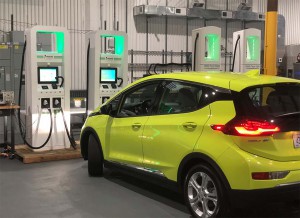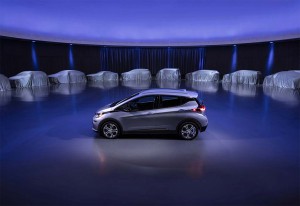
GM's Mark Reuss believes that EVs will reach cost parity with gas-powered vehicles sooner than people think they will.
The auto industry is planning to spend in excess of $100 billion over the next decade on the development of electrified vehicles, pure battery-electric models, in particular – so much that even industry giants like Ford, Volkswagen and Toyota are opting to partner with traditional competitors to spread out spending.
One of the concerns is that manufacturers will have to not only put out that money up front but then swallow some of their production costs to keep those battery-cars competitive once they reach market because they will be more expensive to build. That was a warning delivered by a top Toyota official during a briefing in Tokyo on Friday morning.
But that may not prove nearly as dire a problem as anticipated, General Motors President Mark Reuss said during a conference early this week where he said he sees the cost of a BEV and a comparable gas model will “reach parity a lot sooner than people think.”
Exactly how soon wasn’t something Reuss specifically answered, but in a conversation with TheDetroitBureau.com earlier this year, the executive noted that GM had already driven the cost of the batteries for its Chevrolet Bolt EV down to less than $150 per kilowatt compared to the nearly $1,000 a kWh it had spent a decade ago when it was readying the original Chevy Volt plug-in hybrid.
(Toyota speeding up EV development program. Click Here for the story.)
That is still a substantial amount, working out to around $9,000 for the 60 kW battery pack in the Bolt EV, however. Industry experts have been looking to a number more in the range of $50 to $60 to be able to deliver a cost-comparable battery-car.
That could happen by mid-decade, according to some experts, such as the Boston Consulting Group. Others think it would take until sometime closer to 2030. And there are those who don’t expect to ever see that number from lithium-ion technology, betting parity will require the introduction of an alternative, such as the solid state batteries many labs are working on.
One can read into Reuss’s comments to mean GM is looking at a date sometime during the first half of the 2020s in which EV pricing is no longer an issue for a potential buyer.
There are some challenges, notably including the commodities market. There are concerns about finding a steady and reliable supply of the chemicals needed for today’s batteries, including the namesake lithium. Tesla, among others, has been working to reduce, and even eliminate, the need for other rare earth materials, notably cobalt. The industry upstart also has been looking for ways to cut back on its use of copper and find other creative solutions to slash battery costs.
(Click Here for more about GM and Bechtel planning JV to create new EV charging network.)
The same is the case with all the electronics that go into an EV, notably the big power control systems that have to handle nearly as much energy as can flow through the transformers in residential neighborhoods, as well as the increasingly powerful motors manufacturers are turning to.
Of course, it also helps that battery-cars don’t need the increasingly complex technologies that manufacturers are turning to in order to meet ever more stringent emissions and fuel economy mandates going into effect worldwide.
Getting costs down to parity is clearly one of the industry’s mantras. And it can’t happen soon enough. Toyota Executive Vice President Shigeki Terashi warned at a media briefing Friday that the automaker doesn’t expect to be able to generate nearly the returns on a BEV as it does on a gas car anytime soon.
That’s one of the reasons so many automakers are forming alliances to help spread development costs. On Thursday, Toyota said it would partner with Subaru to develop an EV-only vehicle platform. BMW and Jaguar Land Rover this week said they would team up to develop the underlying components of an EV. And Ford is negotiating an EV joint venture with Volkswagen, the latter maker already confirming plans to put about 50 all-electric models in production by 2025.
(To see more about GM CEO Mary Barra confirming plans for a battery electric truck, Click Here.)
An old adage in the auto industry is that product planners would kill their parents to save a nickel a vehicle. They’re going to have to save a lot more than that to reach parity on EVs.


